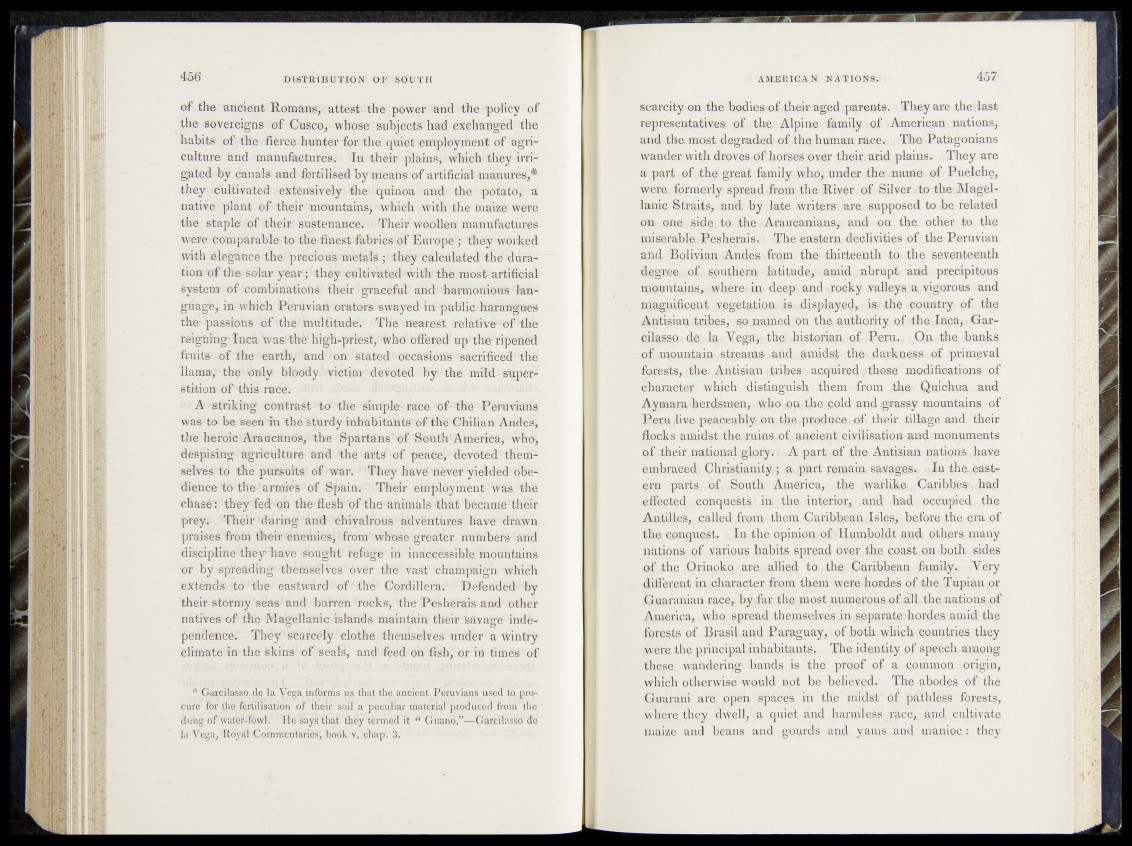
of the ancientPom&ns, attest the power ;and the policy ,;of
the. sovereigns1 of Cüsc@| whose subjectshad CMfranged ïfbe
habits; of th e ’ÉèreebwBteivföi^fhé'cjaiët'ïeffiJileyiöéiSf ntflfc^ri*'
emlturé and mamifaöturesö In theie ^»laSns^ which they irrigated
by danateund fertilised hymeahsnof artificial Tn*&ntireS,#
they- cultivated ’extensively the« quinea- and feb 'pötêtö,' ’ a
native ■ plant bfdheir mountains^ ' whidi writh the inaizê Wërë
the stapte of theiriisustenasee.u Thei/woöïlerr marmfimturés
were.' eomparabte to feefihest fabricsidf Europe'f feeyhWdtkëd
with elegassceithe 'prëeiouh'metaïs; ! they calödlatëd ftkë dura1-
tion rqf tbes solar y ^ rq they cultivated Writh the roosfcartifieM
system of JsêiBfbiBatóon^ their «graceful' and 'teartiionMhS^an-
ghagfe^ im which Peru viam orators^ swayed1 In public! feaVahaguéë
thé5 paSsiotas d f1 thé1 multitu<M iffhe''nearest ié]^iVë%fl3ftïè
reigning* Ined was£lhêlhlgh«pffesfcy Who* Offered up1 thé ripeai^d
fruits^ of the ®earthy1;and1 2oiï Stated11 oëcaSiëfiS*sétèrifiëëd *xtMi
llama, the Only bloody vietim6devoted by thé mild ' superstition
of this race.
A striking contrast to-‘the-^^toplev^£K;e!0fr>the «PéïWtlfrrfs
was to be seen théhturdy inhabitants o f tfe ;6hiliab Ad4elS,
the heroic Araöcanös, the Spartöiis ' ofiSouth' America, who1,
despising’= agrieültöré and thé atitSmf peaêei^dte^étèd^feöft
selvèsH© the pursuits' óf !war. r(Thëy haüëdièvëfyididëd^Bé4-
diëhce tb ! theJ anöfëS" óf Spains151 Thëir ètópldymèntJW^s fhè
ehasër’tfréy'fed öh the flesh of the animals th a t sbeëariïë!théir
prey. Their daring mnd Chivalrous advëhtüïes11 havé drawn
praises fróte their énethiës]* from5 whose gfeafer numbers and
diseiplinmthey'bavfe j^0ught rëfugé hi''inacëéSsible mountains
or1 By spfeadihgi JthemëèlVesrëvér the tast’ ’champaigix Which
extends l t d e a s tw a r d of thé Cordillera. Défeh'déd,f'by
their stormy ^sëas'and' barren rocks, the Pesherais and1. Other
natiVësDf thmMagëllanic'islands maintain their savage ihdé-
pencleneeir‘ Thé ƒ 'éëareely1 clothe themselves tinder a Wintry
elhBatê'in the Skins3'èf*’êedtó, and feed on fish,'or in times ‘Of
* Garcilasso de la Vega informs us th^t the ancient Peruvians used to prq-
cure for the fertilisation of their soil a peculiar material‘produced from the
dung of water-fówl. He says that they termed it “ Gv&ap.”—Garcilasso de
la Vega, Royal Commentaries^ book v. Chap. 3.
Spat^rilyipndije bodies of their agediparerats. »They are* .the* last
ipprqsqnfatives ©f^ithc iAlpno Ofe.mily-->af. sAmerio.au ynations>
and. the, most degraded) o f t he hum am rao e </..»Th e P atagonian s
wanderfWife. droves.ofiiiof’soSioMr their; arid plains«MsThey tare
a parfeiof iitteigtóat familyiWihnj undf^ithet*®mm©;<rf Pheleh^
wn^fe^nfierlyjSpïieadrfrfimdthir^iyèfvcrfi'SMveni'tO'the; JWagei*
lanic §fehsy:Pndr, by l-a4ê^wiitemr^re»jsnppbsed to* be, related
on^rOnetiMdSitfe^lt^wAraéëanie^w/siai^rjonri the •Qthëast© fee
miaerohlo« Pe^l^paisci Hhe-seagtern • d&eliiride^fdvdbe j Peruvian
apdfiP^lsviansAndeévfrdmt feej-feii?tie©nfeft(oxfe©'>aev©m€onfe
degrnei f^ofcc^trdheraii f latitude®! jamid a abrupt? precipitous
mountains» wfeereidm deèfb(a^ir^hyfyuileyöjar>¥igf®ouB tand
f a displayed, is the ^ é ém of 5fe§
Aptisiap tribes, s%nam^bfn th$>^thQ$tyri©f ifee tJi^oajgrjGa#-*'
fep; ibapks
pfjjmpumiaip^sfrjeainsr^^diiamid^ritheiidai^^fas jj^f primeval
%§0si^,ifeft Antisian itpheshao^uwadYfeOse na^difioatioiaftiöf
eh araetere which distinguishthem from fee-? Qjiiekafsoand
Aymaraherdiman^^h^opifee ptddrjand^l^py mountain^ of
Pepsudivftpf^^n^hly^Otfeo producrbof -their tillage and their
flock sv^midstftho rumsbof^apeignti civilisation; and;mopimio?ks
qf, feeir^i^iopal^loCT. +aA p§rtiof |h§ Aqtisjap-natipusubaye
embrnnadtiC'hript^.nityii a part rpmain, s^aggsp gjn fee-eaeb-
§^n .parts, of, ,§pufe Amm'icajp.the iwarlfkej^Caril^ea-jfhad
e%0te4B§qpq!ia#i^%i(iftffh%/inferio.raitand! thadripo^uipiedafe^
Antibes*/ called from feeip. iQarfefeeap (Jsl§&<,bgfQ^a(fee erp,; of
feet conquest. . Id fee .opinioq^iPuiQpoldf -ahdi qfeorpipaany
natjopg ,qf ,ygrioua;|iabita spread qver.ifee.qoast/on tbotb -sides
of; the pripokp 1 arp rrallipd to /the . )Qarfbbean v¥©r-y
diffei'ent in character, from feem iwer^hqifd§§ q^fen^upia11 or
fruaranian race>,byffarife©
America, vfeo, spreaddh§ffiae|Y§8dB')?nparate«horde^(amidifee
forests of Brasil and Paraguay,,’ipf untries they
K^ece .fee principal inhabitants. Thojidqntdy pf speqfeganrong
these wandering bands is the proof of a commoa origin,
which otherwise Would not be believed; The abodes of the
Guarani are open 11 spaces ïïl' the mid'st'öf ^athlesk' forests,
wher'e they d\yell, a ^^4. cultivate
maize and beans and gourds and yams and. manipcq they